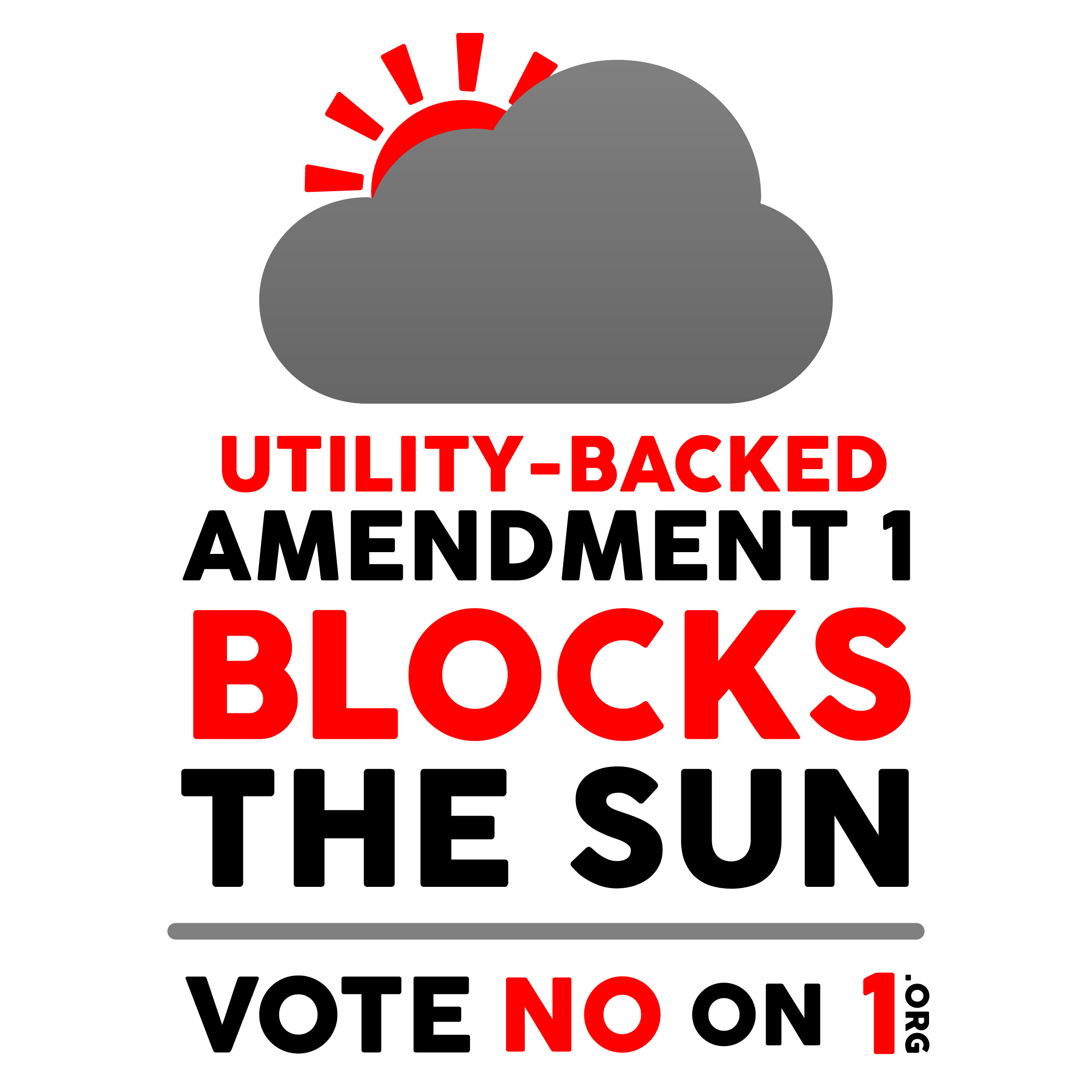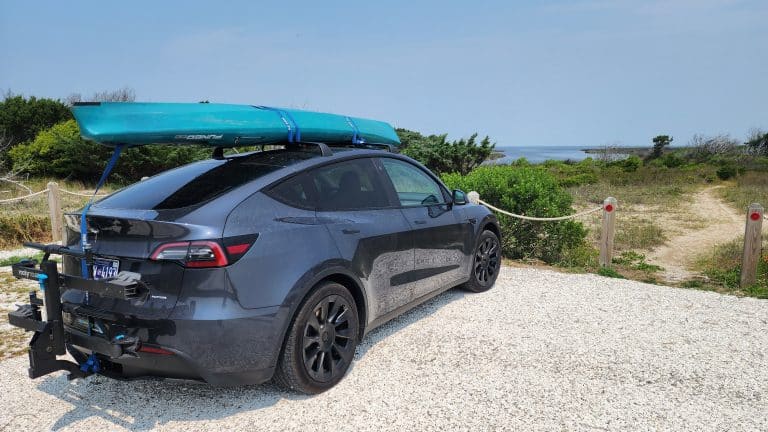Florida is the Sunshine State, right? But you wouldn’t know it by looking at Florida rooftops. There are 9 million electricity customers, yet less than 12,000 solar rooftop systems. Even though Florida is one of the largest electricity markets in the country, it ranked 17th in solar development last year. So, the state shouldn’t be throwing up additional barriers to solar power.
Yet, a proposed amendment – Amendment 1 – on the November ballot, if passed, will pave the way for additional barriers to rooftop solar, such as the imposition of fees on solar customers. What’s worse is that voters may believe they are voting for a pro-solar amendment, when in-fact, they are not.
That’s why Florida Supreme Court Justice Barbara Pariente, in her dissenting opinion, warns pro-solar consumers to “beware” and describes Amendment 1 as a “wolf in sheep’s clothing”. It’s even opposed by the state’s solar industries association – which filed a brief opposing it at the Supreme Court. They view it as a clear and present danger to the state’s net metering policy. That’s the policy that allows a customer to generate rooftop solar power, interconnect to the grid, and provide any excess power back to the grid.
If solar advocates don’t support it, then who’s behind it?
Power Play
Amendment 1 is primarily bankrolled by the big monopoly utilities, led by FPL and joined by Duke Energy, Tampa Electric and Gulf Power through a political committee called Consumers for Smart Solar. It’s an unholy alliance that’s raised over $18 million towards getting it on the ballot and convincing voters to adopt it. The power companies originally launched it as an effort to derail the 2016 ballot bid of the Floridians for Solar Choice citizen-led solar ballot initiative that would have allowed a non-utility to provide solar-generated electricity directly to a customer. They succeeded in stalling it by starting a price war for paid petition gatherers and prohibiting circulators that carried the utility-backed petition from carrying the citizen-led solar petition.
Amendment 1 is entitled: Rights of Electricity Consumers Regarding Solar Energy Choice. Do Florida’s monopoly utilities really want to expand solar choice and the rights of rooftop solar? Florida voters should be skeptical. After all, they seem to be doing quite well as the sole provider of power to a captive customer base. FPL made $1.65 billion dollars last year in profit. It should come as no surprise that FPL helped write the amendment and that the language paves the way for additional barriers to rooftop solar.
Moreover, the power company trade group, the Edison Electric Institute, has identified rooftop solar as a threat to the electric utilities’ profits and its business model. FPL in recent comments filed with the Public Service Commission attacked the state’s net metering policy. FPL alleges, without any data, that allowing customers to install solar and use the current net metering policy creates a “subsidy” on non-solar customers.
Take FPL’s concern for non-solar customers’ interests with a grain of salt. The company is back this year before the Florida Public Service Commission asking for an additional $240 million dollars in profit as part of a $1.3 billion rate increase on its customers. Let’s take a closer look at the text of Amendment 1.
Additional financial barriers to rooftop solar
The focus of the amendment is found in the last provision – which paves the way for weakening or eliminating the state’s net metering policy, or imposing discriminatory fees on customers that generate solar power. It provides that “consumers who do not choose to install solar are not required to subsidize the costs of backup power and electric grid access to those who do.” Sound familiar?
Amendment 1 would create a legal presumption in the Florida Constitution forever that solar customers aren’t paying their fair share of the utility’s costs by generating their own power and sending any excess back to the grid. Yet, the presumption has no factual basis in Florida. In fact, reputable studies conclude that solar customers are providing a net benefit to the utility’s system – and therefore all customers – by self-generating solar power. Solar rooftop power has a host of benefits to a utility’s grid including fuel savings, reduced line loss, acting as a hedge against spiking fuel costs, not to mention keeping energy dollars in the state and local economic development and job creation.
If it passes, expect the monopoly utilities to use Amendment 1 as a pretext at the Legislature or the Florida Public Service Commission to weaken or eliminate net metering or impose discriminatory fees on solar customers. That’s what big power companies are doing in other states. Florida voters may be fooled into voting for a pro-rooftop solar amendment, when in fact, they are not.
New Rights?
The first provision in the summary establishes a right under the Florida constitution for “consumers to own or lease solar equipment installed on their property to generate electricity for their own use.” Fact is, the right to own or lease solar equipment already exists in Florida statute and in the net metering rule.
The proponent power companies argue that it elevates and existing right to a constitutional right so “special interests” can’t take the right away. While placing the right in the constitution may provide the right more protection, it begs the question, what’s the threat to current policy? Moreover, this argument is disingenuous coming from monopoly utilities as they are the special interests that threaten rooftop solar policy by throwing additional roadblocks in front of solar customers.
Consumer Protection?
The second provision states that “state and local governments shall retain their abilities to protect consumer rights and public health, safety and welfare ….” Yet, if state and local government retain power, where is the additional protection in the amendment? Truth is, current consumer protection laws would remain in place, regardless if the amendment passes or not.
Get ready, be informed
The utilities – working through Consumers for Smart Solar – have bought at least $6.5 million in advertisement buys, which means voters will be carpet bombed with ads extolling the virtue of the amendment’s alleged new rights to install solar on rooftops and its anti-scam provisions. Unfortunately, It’s a slick, well-financed deception campaign.
It’s critical to note that only about 1/10th of 1% of customers currently use rooftop solar in Florida. That is magnitude of times lower than rooftop solar penetration in other states. Shouldn’t the Sunshine State be embracing a clean energy future and expanding access to the economic benefits of rooftop solar power to more customers – including to underserved communities?
Don’t be fooled. Amendment 1 will move rooftop solar out of reach for many of Florida’s families and businesses and drag state solar policy backwards. Amendment 1 Blocks the Sun.



